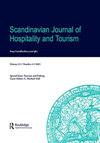Tourists’ willingness to pay for Blue Flag's new ecolabel for sustainable boating: the case of whale-watching in Iceland
IF 3.6
4区 管理学
Q2 HOSPITALITY, LEISURE, SPORT & TOURISM
Scandinavian Journal of Hospitality and Tourism
Pub Date : 2020-06-12
DOI:10.1080/15022250.2020.1779806
引用次数: 17
Abstract
ABSTRACT Despite its positive image boat-based marine wildlife tourism, including whale-watching, endangers animals’ habitats and populations. This highlights the importance of transitioning towards more sustainable forms of boating. This could be achieved through certification with ecolabels that establish clear guidelines for operators, and ensure compliance, while informing tourists of these higher standards. Ecolabelled operators should be able to gain a competitive edge by offering a more sustainable product. The aim of this paper is to analyse tourists’ willingness to pay for a new ecolabel for sustainable boating in the case of whale-watching in Iceland using the Contingent Valuation Method. Results of a survey of 337 whale-watchers show that 60% were very likely to choose an ecolabelled tour, and that 65.9% were likely or very likely to be willing to pay ∼20% more for an ecolabelled tour. Considering the intention-behaviour gap, the low importance of environmental issues for choosing the operator, and other biases, it is probable that the ecolabel would only influence preferences in a limited market niche. We suggest that the new ecolabel has a high potential for promoting sustainability in boating tourism if it develops into a full-blown CSR approach that covers a content broader than just environmental issues.游客愿意为蓝旗公司的可持续划船新生态标签付费:冰岛观鲸的例子
尽管以船为基础的海洋野生动物旅游(包括观鲸)具有积极的形象,但却危及动物的栖息地和种群。这凸显了向更可持续的划船形式过渡的重要性。这可以通过生态标签认证来实现,为经营者制定明确的指导方针,并确保遵守,同时告知游客这些更高的标准。生态标签的经营者应该能够通过提供更可持续的产品来获得竞争优势。本文的目的是分析游客的意愿支付一个新的生态标签可持续划船在冰岛的情况下,使用条件评估方法。对337名观鲸者的调查结果显示,60%的人很可能选择生态标签游,65.9%的人很可能或很可能愿意为生态标签游多支付20%的费用。考虑到意向-行为差距,环境问题对选择经营者的重要性较低,以及其他偏见,生态标签可能只会影响有限市场的偏好。我们认为,如果新的生态标签发展成为一种全面的企业社会责任方法,涵盖的内容不仅仅是环境问题,那么它在促进划船旅游的可持续性方面具有很大的潜力。
本文章由计算机程序翻译,如有差异,请以英文原文为准。
求助全文
约1分钟内获得全文
求助全文
来源期刊
CiteScore
7.90
自引率
8.30%
发文量
14
期刊介绍:
Scandinavian Journal of Hospitality and Tourism is the leading Nordic journal for hospitality and tourism research. SJHT aims at initiating and stimulating high-impact and innovative research relevant for academics and practitioners within the hospitality and tourism industries. The journal takes an interdisciplinary approach including, but not limited to geography, psychology, sociology, history, anthropology, and economics. SJHT encourages research based on a variety of methods, including both qualitative and quantitative approaches. The journal covers all types of articles relevant to the Nordic region, as well as the North Atlantic, North Sea and Baltic regions. We also welcome reviews and conceptual articles with a broader geographical scope that clearly enhance the theoretical development of the hospitality and tourism field. In addition to research articles, we welcome research notes and book reviews. Published articles are the result of anonymous reviews by at least two referees chosen by the editors for their specialist knowledge.

 求助内容:
求助内容: 应助结果提醒方式:
应助结果提醒方式:


